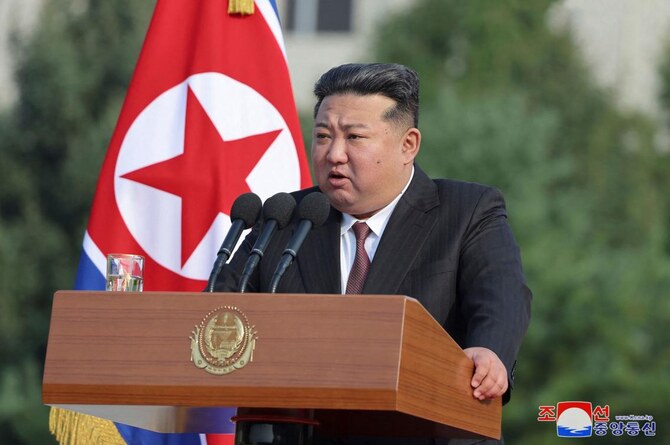SEOUL: North Korean leader Kim Jong Un said his country will speed up steps toward becoming a military superpower with nuclear weapons and would not rule out using them if it came under enemy attack, state news agency KCNA said on Tuesday.
Kim mentioned South Korean President Yoon Suk Yeol by name for the second time in a week in denouncing Seoul for colluding with Washington to destabilize the region to gloss over the fact it does not even have proper strategic weapons.
“Yoon Suk Yeol made some tasteless and vulgar comment about the end of the Republic in his speech, and it shows he is totally consumed by his blind faith in his master’s strength,” KCNA quoted Kim as saying, referring to the South’s alliance with the US
“To be honest, we have absolutely no intention of attacking South Korea,” he said in the speech at the Kim Jong Un National Defense University, a training ground for elite military specialists.
“Every time I stated our position on the use of military force, I clearly and consistently used the qualification ‘if.’ If the enemies try to use force against our country, the Republic’s military will use all offensive power without hesitation. This does not preclude the use of nuclear weapons.”
“Our footsteps toward becoming a military superpower and a nuclear power will accelerate,” he added.
North Korea has for decades pursued a nuclear weapons program and is believed to have enough fissile materials to build dozens of the weapons. It has conducted six underground nuclear detonation tests.
Last week, South Korea marked an annual armed forces day with a large military parade showcasing a ballistic missile capable of carrying a massive warhead and featuring a flypast of a US strategic bomber.
In his address that day, Yoon warned the North against using nuclear weapons. “That day will see the end of the North Korean regime.”
North Korea may be building a new submarine, the South Korean defense ministry said citing intelligence indications in a report to a member of parliament. In January, Kim reportedly ordered a nuclear submarine to be built.
The construction was at an early stage and it was not clear if the vessel was a nuclear-powered submarine, said the report.
North Korea is also working on a submarine drone that could be developed to carry nuclear weapons, possibly with the help of Russia, it said.
KCNA said Kim made his “military superpower” remarks on Monday, the same day the North has said its Supreme People’s Assembly would meet to discuss amending the country’s constitution. The news agency has made no mention of the assembly’s deliberations since Monday.
The session is being closely watched because of the likelihood it would approve a constitutional amendment to reflect Kim’s statement that unification is no longer possible and the South was a separate country and “a principal enemy.”
Such a move would formalize Kim’s break with decades-old goal espoused by both countries of national unification and attempts to improve ties, including a 2018 summit where their leaders declared there will be no more war and a new era of peace has opened.
In a separate report, KCNA said Kim sent a birthday message to Russian President Vladimir Putin, calling him his “closest Comrade and saying “strategic and cooperative relations” between the two countries will be raised to a new level.
South Korea’s Defense Minister Kim Yong-hyun said “there was a high possibility” North Korea could deploy troops to help Russia in the war with Ukraine.
Kim also told a parliament hearing news reports of North Korean military officers having been killed in a Ukrainian strike in Russian-occupied territory were likely true.
Kim Jong Un and Putin in June adopted on a comprehensive strategic partnership that includes mutual defense pact.
The two countries have denied accusations by US and South Korean officials the North was supplying arms to Russia.


North Korea’s Kim Jong Un wants to speed up becoming a nuclear superpower
Short Url
https://arab.news/9cqmv
North Korea’s Kim Jong Un wants to speed up becoming a nuclear superpower

- North Korea has for decades pursued a nuclear weapons program and is believed to have enough fissile materials to build dozens of the weapons
Kremlin: Can’t say yet when new talks on Ukraine will take place

- State news agency TASS earlier reported next talks would be held in Geneva
MOSCOW: Kremlin spokesman Dmitry Peskov said on Friday that he cannot yet confirm when and where a new round of talks on Ukraine will take place.
Earlier on Friday, Russian state news agency TASS reported, citing a source, that next talks would be held in Geneva with the participation of delegations from Russia, Ukraine and the United States.
Earlier on Friday, Russian state news agency TASS reported, citing a source, that next talks would be held in Geneva with the participation of delegations from Russia, Ukraine and the United States.
© 2026 SAUDI RESEARCH & PUBLISHING COMPANY, All Rights Reserved And subject to Terms of Use Agreement.












